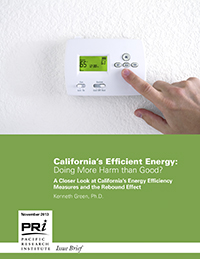When it comes to saving the planet, some of the most popular weapons are policies to promote energy efficiency. As Tim Greeff, deputy legislative director of the League of Conservation Voters recently quipped, Efficiency is always the cheapest, cleanest, safest, quickest way to cut down on both global warming and pollution (Gies, 2008). Greeff isnt alone. Numerous key players in the energy community have put a great deal of faith in energy efficiency measures (which run the gamut in scope from green refrigerators to solar panels to electricity-saving televisions) as the torch that leads the way to a brighter, greener future. As an article from The Breakthrough Institute notes:

Energy efficiency has frequently been cited as the single greatest contributor to emissions reduction and climate mitigation strategies, by everyone from the International Energy Agency and Intergovernmental Panel on Climate Change to consultants like Amory Lovins Rocky Mountain Institute and McKinsey to efficiency advocates and environmental NGOs. The IEA counts on efficiency for roughly half of the emissions reductions needed in their Blue Map climate stabilization scenario (graphic below), for example, while President Obama told reporters in 2009 that with efficiency, we can save as much as 30 percent of our current energy usage (Jenkins, 2011).
If energy efficiency is the weapon of choice in the fight for emissions reduction and climate mitigation, its safe to say the state wielding it most vigorously is California. When the California Public Utilities Commission claims that, California has led the nation in energy efficiency programs since the 1970s, it isnt boasting (California Public Utilities Commission, 2013).

